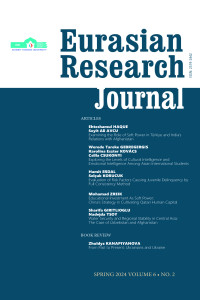Öz
This paper investigates the strategic use of education as a tool of soft power, focusing on China’s investment in the education of Qatari human capital. It explores how education, a non-coercive form of influence, contributes to China’s global reputation and socio-economic progress. The research employs a mixed-method approach, including quantitative surveys and qualitative interviews, to assess the impact of Chinese educational investments on Qatari students. The findings indicate that China’s educational support, through scholarships and cultural exchange, positively influences Qatari students’ perceptions and fosters a favourable image of China. The study highlights the significance of educational investment in building soft power, with China utilizing scholarships and cultural programs to attract international students, particularly from the Gulf Cooperation Council (GCC) region. The effectiveness of China’s soft power strategy is demonstrated through increased educational cooperation under the “Belt and Road” initiative, contributing to China’s global influence and international relations.
Anahtar Kelimeler
Soft power Educational investment China Qatari students International relations.
Ayrıntılar
| Birincil Dil | İngilizce |
|---|---|
| Konular | Uluslararası İlişkilerde Siyaset |
| Bölüm | Research Articles |
| Yazarlar | |
| Yayımlanma Tarihi | 30 Nisan 2024 |
| Gönderilme Tarihi | 21 Mart 2024 |
| Kabul Tarihi | 25 Nisan 2024 |
| Yayımlandığı Sayı | Yıl 2024 Cilt: 6 Sayı: 2 |


